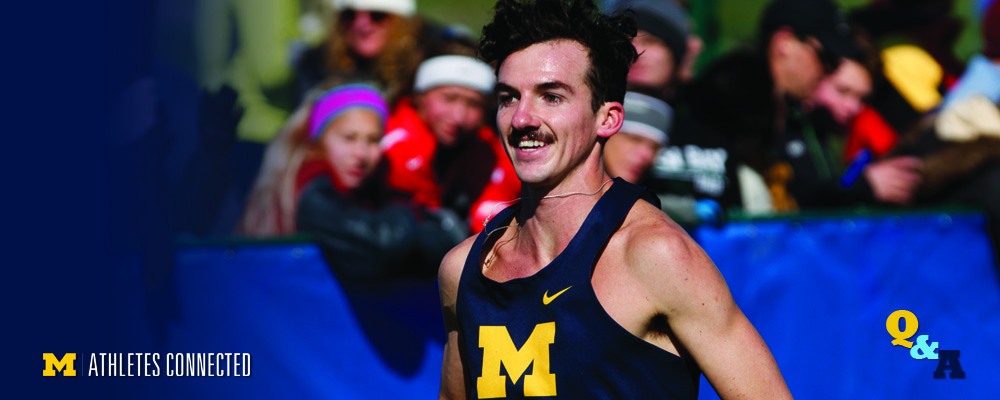
The Athletes Connected program recognizes the many different entities that factor into student-athlete mental health. As part of our Q&A series, Athletes Connected shares how coaches, administrators, athletic trainers and other athletic staff approach their roles in the lives of student-athlete health.
To continue the series, Athletes Connected caught up with long distance runner Ben Flanagan of the men’s track & field/cross country team.
See our preview Q&A posts:
U-M senior associate athletic trainer Jeremy Marra
U-M head diving coach Mike Hilde
Q: Tell us about yourself. What are you studying? What are your passions? What do you do away from your sport and school?
A: I am currently a graduate student in the School of Social Work, studying interpersonal practice with a focus on mental health. I am also a senior on the men’s track & field and cross country teams. I have always been passionate about finding ways to positively influence the lives of others and make meaningful contributions to my local communities. When I am outside of the classroom and off the track, I enjoy spending quality time with my closest friends, catching up with my family back home over FaceTime, and dedicating time to volunteering.
Q: What is your role within SAAC?
A: I am a co-representative for mental health along with Mira Shane, as a member of the executive board for SAAC. Mira and I mostly act as liaisons between the student-athlete community and the Performance Psychology and Athletic Counseling team in the athletic department. We also help with organizing events related to advocating for student athlete mental health support and self care.
Q: What it is like to be a student-athlete at Michigan?
A: Being a student-athlete at the University of Michigan is a truly humbling experience. It presents academic and athletic challenges that are meticulously crafted to unveil one’s true potential.
 Q: Have you seen a that shift in the way mental health is talked about among student-athletes?
Q: Have you seen a that shift in the way mental health is talked about among student-athletes?
A: We are heading in the right direction. I think the importance of mental health is becoming more recognized in the student-athlete community and coaches, athletic staff and faculty members also seem to be becoming more accommodating. I think time is still a limiting factor and can be difficult to overcome considering how booked student-athlete schedules tend to be.
Q: What barriers do you see as to reasons why student-athletes are reluctant to reach out?
A: In my opinion, both academic and athletic settings can have the tendencies to overemphasize the importance of independent work, independent responsibilities, and at times, independent success. As student-athletes it can feel like codependence is a sign of weakness, despite the value it can serve in terms of reassurance, emotional wellbeing, and overall productivity and success.
Q: What will help break down some of those barriers?
A: Continuing education about support networks. The more student athletes know about the resources available and the benefits of using them, the more likely that they will be utilized.
Q: What do you think would be most helpful in breaking that barrier?
A: Empathy. Learning about relatable mental health experiences within the student-athlete community is a humanizing experience that serves as an important reminder that you are not alone.
Q: What advice can you give other athletic departments, from a student-athlete perspective, surrounding mental health support?
A: To faculty members, continue to be understanding when it comes to student-athlete’s concerns. To student-athletes, utilize the resources available to see how they work for you. The hardest, but most important step is the first.
